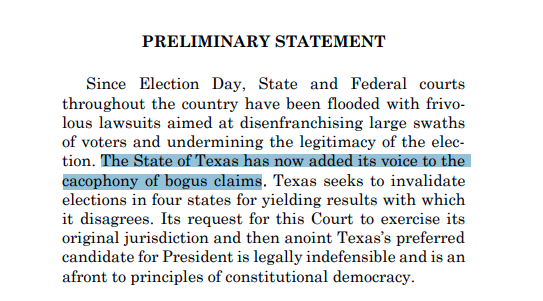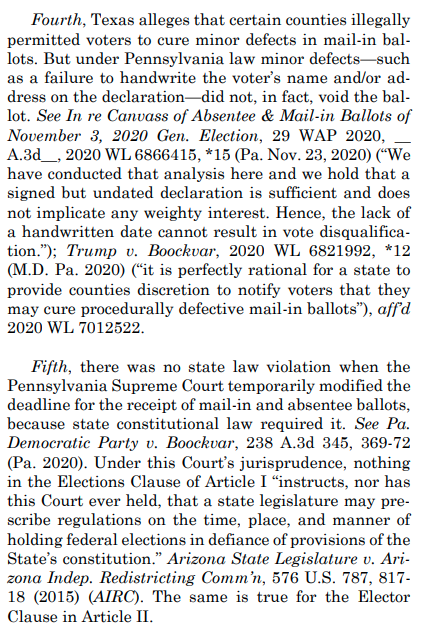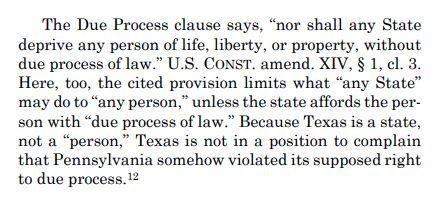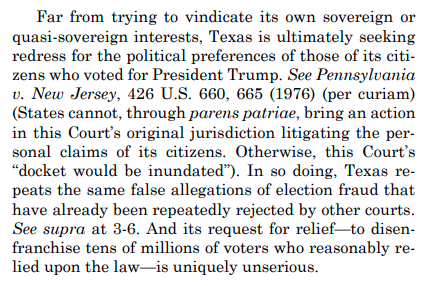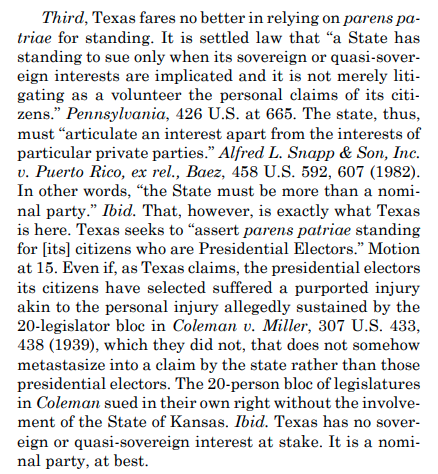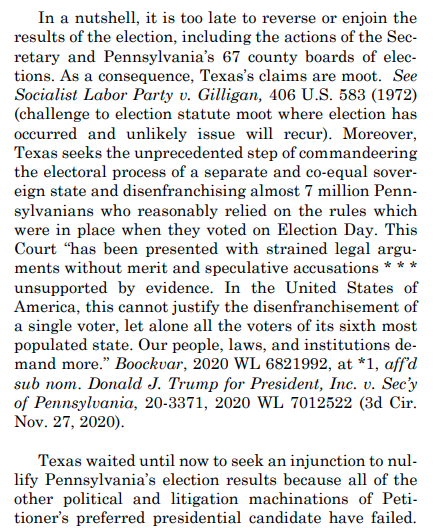Going over Pennsylvania's Brief in Response to Texas's Motion for Leave to File Bill of Complaint in front of SCOTUS, I'm pretty sure they let Gritty write this brutal opening.
Allow me to translate into non-lawyer:
"Texas has no fucking clue what it's talking about. We don't tell them how to make Frito Pie, they shouldn't be trying to tell us what our own laws mean."
"Texas has no fucking clue what it's talking about. We don't tell them how to make Frito Pie, they shouldn't be trying to tell us what our own laws mean."
Here they lay it out in persuasive terms:
Texas is seeking to have SCOTUS disregard the people and anoint a President.
Bonus points for the word "Faustian." It's based off of Faust, wherein a man sells his soul to the devil to gain power.
Texas is seeking to have SCOTUS disregard the people and anoint a President.
Bonus points for the word "Faustian." It's based off of Faust, wherein a man sells his soul to the devil to gain power.
Seriously, that one word sums up the thrust of the argument.
"If you allow this to happen, if you agree to consider this, you are selling the soul of this court to the very political considerations that are supposed to be immaterial to the law."
"If you allow this to happen, if you agree to consider this, you are selling the soul of this court to the very political considerations that are supposed to be immaterial to the law."
Theory behind this, by the way:
In 1869, SCOTUS addressed, in its determination States cannot secede unilaterally under the Constitution, what the Constitution means when it says "State."
In 1869, SCOTUS addressed, in its determination States cannot secede unilaterally under the Constitution, what the Constitution means when it says "State."
Notably, this was that there are two definitions - a political entity determined by the people and a geographic meaning.
So someone may say "OF COURSE A STATE HAS A RIGHT TO DUE PROCESS, THEY'RE ENTITIES OF THE PEOPLE." However, that would be somewhat missing a couple points.
So someone may say "OF COURSE A STATE HAS A RIGHT TO DUE PROCESS, THEY'RE ENTITIES OF THE PEOPLE." However, that would be somewhat missing a couple points.
First, we do not presume the words in a Constitutional provision were chosen carelessly. For instance, many Constitutional protections apply to all persons - regardless of citizenship - so long as they are on American soil.
This is based on the fact the Constitution has created classes because it uses two words: "Citizen" and "Person" throughout. Where arguments have been that "person" meant only citizens, the Court rejects the same.
Basically saying "No, see, because the Constitution says when it means a citizen by using the word citizen. Here they said 'person.' They didn't mean only citizens, or they would have used the word they use when they clearly mean only citizens."
The Due Process Clause reads as follows (in pertinent part):
"No person shall . . . be deprived of life, liberty, or property, without due process of law."
"No person shall . . . be deprived of life, liberty, or property, without due process of law."
However, throughout the Constitution where they are referring to a right or power of the State (either as an entity or a geographic area) it uses the term "State."
So, much as the old argument between whether "person" was limited to only citizens in the Fifth Amendment, the fact the word State was not used here, when used elsewhere, indicates the Due Process Clause does not apply to states. It applies to people.
TO THAT END that isn't to say a state CAN'T bring an action on behalf of their people. It just means it seeks its standing not from Due Process, but rather from parens patriae - the legal theory that a state can and should act to protect its citizens as a whole.

 Read on Twitter
Read on Twitter